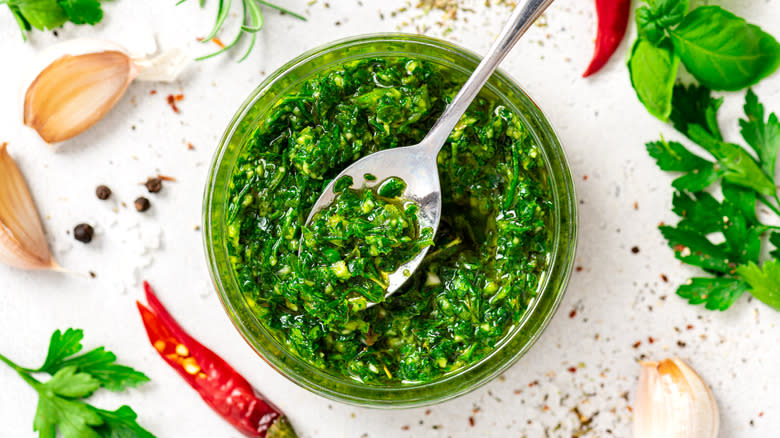Chimichurri Will Elevate Your Steak And Eggs Every Time

Steak and eggs is a hearty, protein-packed breakfast that hits the spot and keeps you satiated. When the dynamic duo comes with chimichurri on top, it somehow manages to taste even more delicious. The vibrant and zesty Argentinian sauce, known for its compatibility with beef, achieves culinary synergy when paired with steak and eggs, creating a morning meal experience that transcends the sum of its parts. At its core, chimichurri (whose nomenclature and origin remain a mystery) is a blend of herbs, garlic, vinegar, and oil. The aromatic condiment, which is sometimes confused with pesto, serves as a vivid complement to the robustness of the tender steak and velvety eggs.
One of the key ingredients in chimichurri is parsley, which gives the dressing its iconic green hue. Parsley's earthy notes add a layer of freshness that cuts through the richness of the steak and eggs. Garlic, another integral element, infuses the chimichurri with a pleasantly pungent — but not overpowering — quality. The garlicky punch enhances the overall taste while permeating the steak, further drawing out its inherently juicy, savory character. Many agree that the coupling of garlic and steak is a classic as chimichurri effortlessly brings the two even more closely together.
Read more: Ingredients To Take Your Scrambled Eggs To The Next Level
Steak, Eggs, And Chimichurri Are A Beautiful Match

Vinegar, one of the tangier components of traditional chimichurri, serves a dual purpose. Its natural acidity enlivens the dish while acting as a tenderizing agent for the steak. The vinegar helps break down the fibers in the meat, resulting in a more succulent steak that practically melts in the mouth. The oil in chimichurri, typically extra virgin olive oil, contributes a luxurious, silky mouthfeel that perfectly complements the fare. The oil harmonizes with the creamy yolk and serves as a trusty medium to distribute the herbs' and garlic's notes across the plate.
There are several feasible substitutes for a homemade chimichurri recipe. For instance, if you don't have parsley readily available in your spice cabinet, feel free to experiment with cilantro, basil, tarragon, or oregano for a twist. White wine vinegar can stand in for its red cousin, offering a slightly milder — yet still vigorous — profile. If you're out of olive oil, there are a few olive oil substitutes as well. A high-quality vegetable oil or avocado oil won't drastically compromise the condiment's texture and flavor.
Chimichurri's herbaceous brightness, along with its bite of garlic, its zip of vinegar, and lushness of oil converge to produce a brunch-worthy masterpiece, transforming a simple steak and eggs combo into an eye-catching, sophisticated gastronomic delight.
Read the original article on Mashed.

